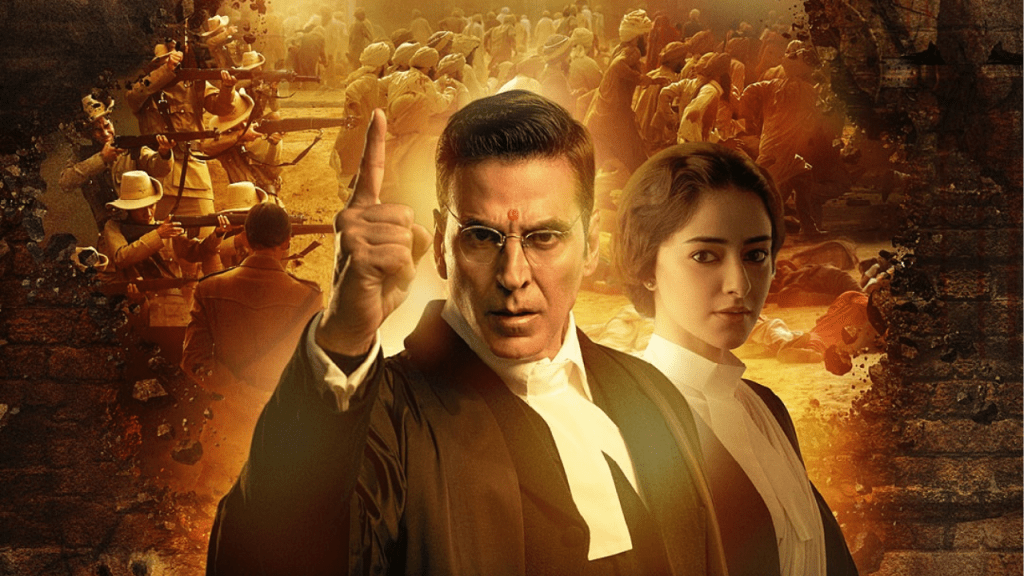Language: Hindi
Age Rating: UA (Suitable for viewers above 13 years)
Genre: Period Drama, Courtroom Thriller
Cast: Akshay Kumar, R Madhavan, Ananya Panday, Amit Sial, Simon Paisley Day, Regina Cassandra
A Bold Voice from the Past
When Akshay Kumar bellows, “Get the f**k out of my country!” in the climactic courtroom scene of Kesari Chapter 2, it’s not just a dialogue—it’s a gut-punch of patriotic emotion. The film dives deep into one of the most harrowing chapters of India’s colonial past—the Jallianwala Bagh massacre—and elevates it with power-packed performances and a narrative that strikes where it hurts.
Kesari Chapter 2 arrives as a powerful spiritual sequel to the 2019 blockbuster, shifting the battlefield from blood-stained grounds to the echoing halls of justice. Directed by Karan Singh Tyagi and produced by Dharma Productions, this period drama breathes new life into the story of C. Sankaran Nair, one of India’s unsung legal warriors. With its focus on the aftermath of the Jallianwala Bagh massacre, the film transforms a painful piece of history into an electrifying tale of rebellion, resistance, and righteousness.
Story That Demands to Be Heard
Set in the wake of the 1919 Jallianwala Bagh massacre, Kesari Chapter 2 follows barrister C. Sankaran Nair (Akshay Kumar), a man disillusioned by the British Raj’s deceit and inhumanity. The brutal firing on peaceful Indian protesters—many of whom were women and children—compels him to resign from the British council and take the Empire to court. Joined by young lawyer Dilreet Gill (Ananya Panday), Nair launches a legal crusade to expose General Dyer (Simon Paisley Day), the orchestrator of the massacre.
But the road to justice isn’t smooth. The British bring in their own formidable counsel, Neville McKinley (R Madhavan), a brilliant legal mind tasked with defending the indefensible. What follows is a gripping courtroom showdown steeped in strategy, emotion, and explosive confrontations.
Performances That Stir the Soul
Akshay Kumar’s Commanding Performance
Akshay Kumar channels an intense emotional spectrum as C. Sankaran Nair. Whether it’s silent grief, roaring patriotism, or principled defiance, he inhabits the role with conviction and charisma. His courtroom monologues feel like rallying cries for generations, especially the explosive final speech that leaves a lasting imprint.
R Madhavan and Ananya Panday’s Standout Roles
R Madhavan’s portrayal of Neville McKinley is sharp and layered, though the screenplay misses an opportunity to delve deeper into his motivations and personal conflicts. Ananya Panday surprises with a mature and restrained performance, holding her own in scenes brimming with seasoned actors.
Simon Paisley Day’s performance as General Dyer is unsettling and convincing—he becomes the face of colonial cruelty with unnerving ease. Supporting performances by Amit Sial and Regina Cassandra add depth and texture to the film’s narrative.
Authentic and Immersive Storytelling
Director Karan Singh Tyagi crafts a period drama that feels both personal and epic. The Jallianwala Bagh massacre is filmed with haunting authenticity—long takes, minimal background score, and stark visual realism make these sequences unshakable. The courtroom scenes are tightly edited and laced with powerful dialogues that echo beyond the screen.
The screenplay blends historical facts with dramatization, staying largely true to the source material—The Case That Shook The Empire by Raghu and Pushpa Palat. It smartly captures not just the legal conflict but the moral dilemma of a man torn between his colonial allegiance and patriotic duty.
Cinematic and Technical Excellence
From crisp cinematography that captures both the chaos of protests and the sterile tension of the courtroom, to the intricate period-specific production design, every frame is immersive. The costume design subtly reinforces class and power hierarchies of the time, while the lighting choices heighten the emotional beats—especially in scenes of personal reckoning.
Music That Elevates Emotion
The soundtrack of Kesari Chapter 2 is more than just background—it’s an emotional thread that runs through the film. ‘O Shera’ serves as a thunderous anthem of resistance, stirring courage in the face of oppression. ‘Kithe Gaya’ captures the somber mood of loss and reflection post-massacre, becoming the emotional heartbeat of the narrative.
The film also beautifully incorporates Teri Mitti from the original Kesari, playing during a critical turning point. The song evokes a deep sense of nostalgia and patriotism, seamlessly bridging the spiritual legacy of both films. The background score is restrained but potent—enhancing tension during courtroom exchanges and swelling with pride in moments of victory.
Areas for Improvement
- Character Depth: While Neville McKinley is performed brilliantly by R Madhavan, the script could have explored his internal struggles and ethical dilemmas more fully.
- Stereotypical Antagonists: Some of the British characters veer too close to caricature, which slightly dulls the film’s nuanced storytelling.
- Pacing: The film’s momentum dips slightly in the second half, particularly during extended legal arguments that could have been tighter.
Final Verdict: ⭐️⭐️⭐️⭐️ (4/5)
Kesari Chapter 2 is not just a movie—it’s a cinematic tribute to those who dared to defy tyranny. It honors the spirit of legal rebellion and moral courage through a powerful narrative, led by a fiery Akshay Kumar and supported by a commendable cast. Despite minor flaws, it succeeds in being both a history lesson and a visual spectacle.
Should You Watch It?
Absolutely. Kesari Chapter 2 is essential viewing for those who want to revisit India’s freedom struggle through a lens of law, morality, and unflinching truth. Whether you’re a fan of courtroom dramas or historical epics, this film deserves your full attention—preferably on the big screen for maximum impact.
Related Blogs:
- Kesari Chapter 2 Trailer Review: Akshay Kumar and R Madhavan Lead a Powerful Tale of Justice and Resistance
- Akshay Kumar Transforms into a Kathakali Dancer in ‘Kesari 2’: A Powerful Tribute to C. Sankaran Nair
- Kesari Chapter 2 Teaser Review: A Bold and Haunting Retelling of History


